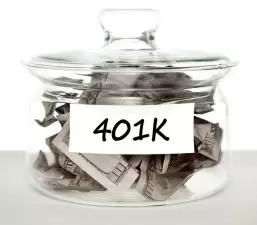
I ran across a really common objection to fully funding your 401(k): Disregard a terribly common bit of advice about your 401(k). This is certainly one of the more well written version of this objection, but it’s not new. Boil the article down though and really it’s the common whine that if you put money into a 401(k) you won’t be able to get it back out (frankly, given the way most people manage their finances, that’s a big advantage). It straw-mans a bunch of personal finance theory, then assumes that consumption smoothness (spending the same amount of money every year) is necessarily more important than other goals, like control over your time.
The straw man
Schrager makes a key assumption at the beginning of the article. She claims that personal finance folk are prioritizing fully funding your 401(k) before any other personal finance goal, like saving up an emergency fund. She doesn’t link where she found this, and the links she does provide don’t seem to over-prioritize the 401(k) at all. This is all too common among critics of fully funding your 401(k), it’s important to make funding your 401(k) sound as scary as possible, what could be worse than going without an emergency fund to keep your 401(k) funded? I believe she saw someone with a list personal to them, somewhere that prioritized their 401(k), but writing a whole article about something that essentially no one thinks is a good idea sounds terrible.
Her Argument
Schrager argues that people with volatile incomes shouldn’t necessarily fully fund their 401(k), and she doesn’t fund her 401(k) beyond an employer provided match. I’m glad that we agree that a bunch of free money is still worth it. She further claims that you can go ahead and invest in stocks outside of a 401(k). She further goes on to throw the IRA into the mix as well. This is perplexing to me, simply because the Roth IRA makes a great emergency fund if you’re like Schrager and aren’t planning on investing in it anyway. (I should clarify, the Roth IRA makes a great emergency fund, but it’s an even better retirement fund. Since your tax sheltered space is limited, I’d strongly suggest contributing to a Roth and an emergency fund, but if you’re gonna be all I’m too good for retirement accounts about it please fund the Roth.) Basically her argument boils down to being scared of the penalty and trying to engage in consumption smoothing.
Good News
Basically the whole argument reads like someone who doesn’t really understand how 401(k)’s work or what the most common personal finance goal actually is. This is really strange for someone who specializes in pension economics. Honestly I wouldn’t bring it up if I wasn’t so sure she was misunderstanding key points about 401(k)’s and personal finance in general. Schrager, you really can have your cake and eat it too. If your goal is “consumption smoothing” you should note that investing in stocks is probably a bad idea. Stock returns are anything but smooth and it’s entirely possible that your income could be correlated with investment returns. Any money going into stocks might as well go into a 401(k), because you can take money out of a 401(k) if you lose your job (the cause, I assume, of the income volatility). Yes you do take a penalty, but you also have a substantially lower tax bill in years when your income is substantially lower. The other important use of the 401(k) is that it allows your total tax bill to hit important breakpoints in the tax code. If you have a pile of stocks (which you apparently do) you should note that you pay no taxes on dividends and capital gains if your after 401k contribution income is below ~$75,000 for those that are married filing jointly. This savings could easily be enough to justify paying the 10% penalty later. Furthermore, money in a 401(k) compounds without taxes. This is often overlooked, but can pay the penalty by itself. For the same tax bracket, you should keep in mind that the total effect of a 401(k) is mathematically equivalent to not taxing earnings on contributions. If you pay an additional 15% in taxes on earnings in stocks outside of your 401(k), then as soon as earnings are about as large as the initial investment you’re doing worse than paying the 10% penalty. This, based on historical stock data, would probably happen in as little as 10 years, so it’s not really fair to use the 59.5 number.
Lastly, most of the people I talk to in the personal finance community rate control over their time far ahead of spending the same amount every year. Any retirement contribution you make today is two similarly sized contributions you don’t have to make next decade. If you overshoot, then you just retire early. Alternatively, when the next job loss comes around you don’t have to panic that you aren’t going to be able to fund your retirement.
Adam Woods is a physicist. His research interests include building software to run and build geomagnetic models. Adam got interested in personal finance in the great recession when it became obvious an interest was necessary.
After harassing his friends and family (and a short intervention) he took to the web where he blogs about finance, investment, politics, and economics.
Adam is currently located in Boulder, Colorado where he can generally be found hiking, biking, or running a D&D campaign. He can also be contacted at adamwoods137@gmail.com.


Interesting article from the economist and rebuttal from you. I agree with parts of each of your arguments.
I do think that some type of liquid savings is valuable and in my opinion this should be outside of 401K because of the penalties and current taxes you would pay on current-day 401K withdrawals. On the other hand, you should be able to withdrawal ROTH funds penalty-free (contributions only, not the growth). I am comfortable with having a slightly smaller emergency fund in cash because I keep track of my ROTH contributions throughout the years as an extra emergency stash, if ever needed.
I also agree with you that 401K investments are valuable beyond the employer-match because of the power of compounding on before-tax dollars. I think it’s a good goal for everyone to TRY to match 401K savings, especially as one’s income & tax bracket goes up. If not today or this year, systematically throughout time (I.E. increase 401K contributions every 6 months to 1 year).
You’re absolutely right. You need liquid savings. My beef is that the economist in question wasn’t using her 401(k) for illiquid savings. She was advocating investing in the stock market in spite of a bunch of tax-sheltered space in her 401(k) going unused. If you’re going to invest in the stock market in the short term, volatility could easily be larger than any penalties you’d pay on the 401(k). I assume that she wasn’t shoving her liquid savings in the stock market, because that’d be crazy. She’s not crazy, just wrong on this little thing.